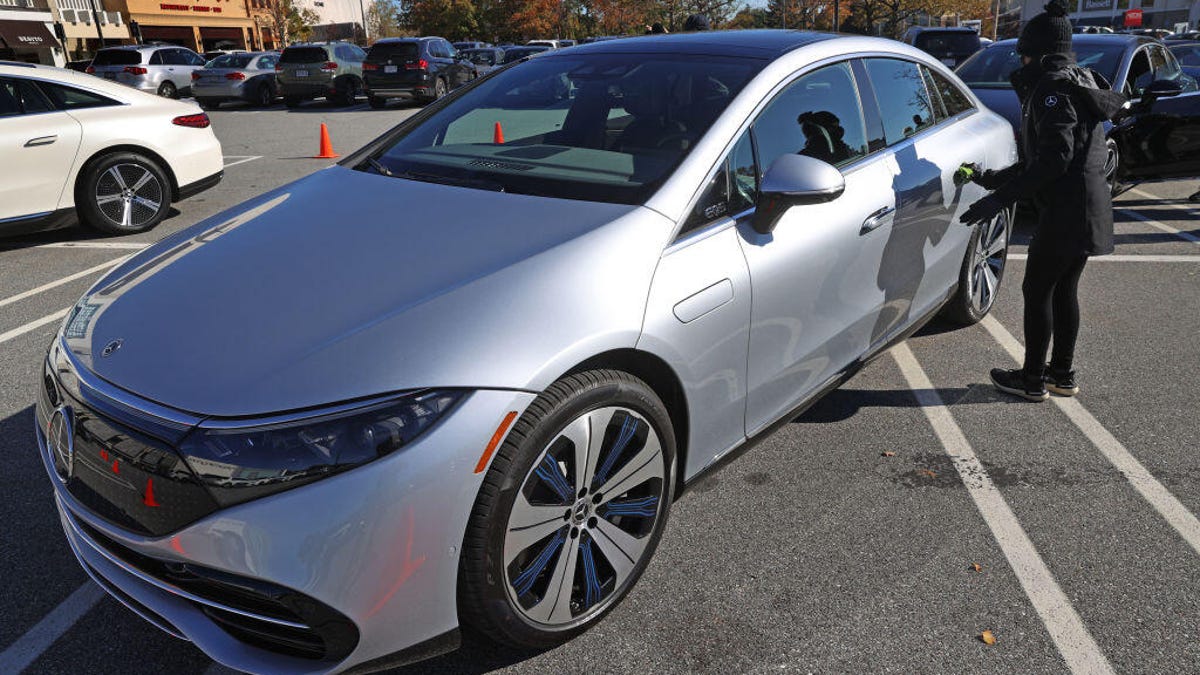Mercedes-Benz is making good on its promise to sell cars that can mostly drive themselves without the driver needing to look at the road. So, if you see a Mercedes with turquoise lights and an inattentive driver, it’ll actually be legal — but only in limited parts of two US states, for now.
The luxury automaker recently began delivering the cars to customers with about 65 cars in the DMV’s systems, according to a report by Fortune. With the delivery of these vehicles, Mercedes became the first automaker in US history to sell cars with Level 3 autonomous driving technology that doesn’t require the owner to pay full attention while it’s active. To date, it is the only automaker with government approval to sell the tech to the general public.
A representative for Mercedes-Benz did not immediately respond to a request for comment.
US buyers of Mercedes EQS and S-Class models can subscribe to Drive Pilot, Mercedes-Benz’s autonomous driving system, for an additional $2,500 yearly fee. But for now, cars with Drive Pilot enabled are only legal in California and Nevada. Mercedes plans to use those states as a test to see how well the technology works, with the hopes that other US states eventually will allow it.
Look for the turquoise lights
Drivers on the road will be able to tell if a Mercedes has Drive Pilot mode engaged by spotting the turquoise lights on the exterior of the car. Mercedes received special approval to use lighting of that color late last year.
The lights will be equipped as part of the headlight and tail light assembly, along with some accent lighting on the mirrors. Other automakers have used this approach for autonomous driving in the past and it’s quickly becoming the standard.
The sale and delivery of these Level 3 cars has been years in the making. Mercedes intended to release the vehicles in 2022, but delays have kept the tech out of consumer hands until this year.
The Level 3 system can’t drive itself all the time
The technology has a catch. Drivers can’t use Drive Pilot all the time. For now, you can only use it on approved roads or certain freeways while going under 40 mph, and only during daylight hours.
The system includes driver-facing cameras, so if a driver does something like using a mobile phone or dozing off, the system will prompt them to turn off Drive Pilot and take manual control again. So if you were hoping to catch up on your TikTok while your car drove you to work, think again.
CNET tested Drive Pilot’s functionality in 2022. The system is mostly meant for slow city driving, including traffic jams, where minimal maneuvering is necessary to remain safe. During testing, we found the system to be a lot smoother and more consistent than the Level 2 systems such as Tesla’s Autopilot system or GM’s Super Cruise.
The system is fairly easy to activate. The steering wheel has buttons to initialize Drive Pilot. The turquoise lights also make an appearance in the cabin to let the driver know that the system is active.
How does Level 3 autonomous driving work?
There are five levels of autonomous driving. Most people are likely familiar with Tesla’s famous Autopilot, which is a Level 2 driving system. That means Autopilot can drive a Tesla on its own, but there has to be a human to monitor the road at all times and retake control if something goes awry. The car can drive itself up and down the road and avoid basic obstacles, but the vehicle can’t make any real decisions on its own.
People have tried to stretch Tesla’s Autopilot system to its limits with disastrous results. This has prompted Tesla to recall vehicles to update the Autopilot software and provide other safety-oriented updates to help prevent collisions in the future.
In a Level 3 autonomous driving environment, the car is smarter. It can make decisions on its own and requires less human oversight. While a driver can take their eyes off the road while it’s active, they must also be ready to retake control if the system senses a scenario it can’t deal with, and gives control back to the driver. Sorry, no sleeping in the car — at least for now.
